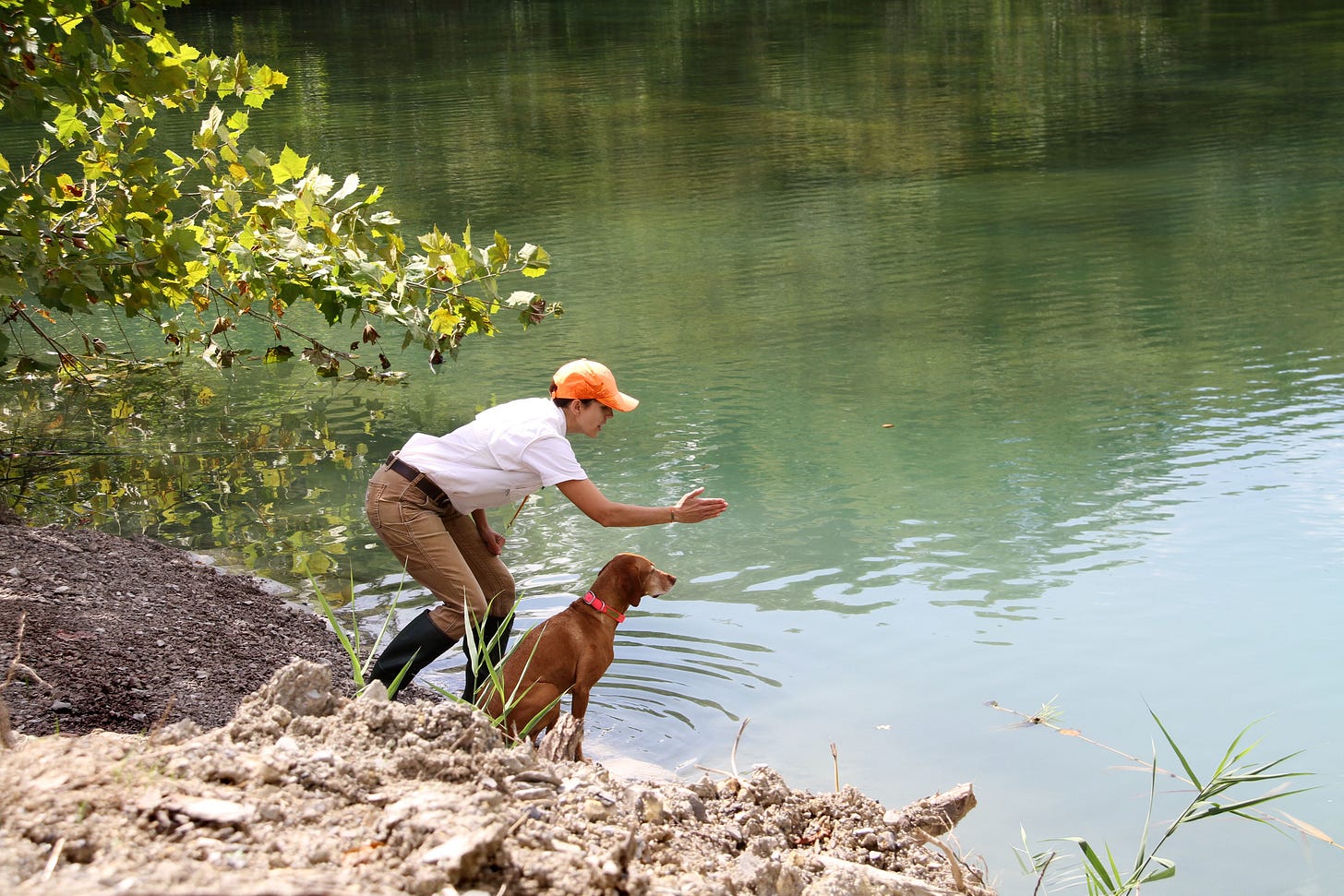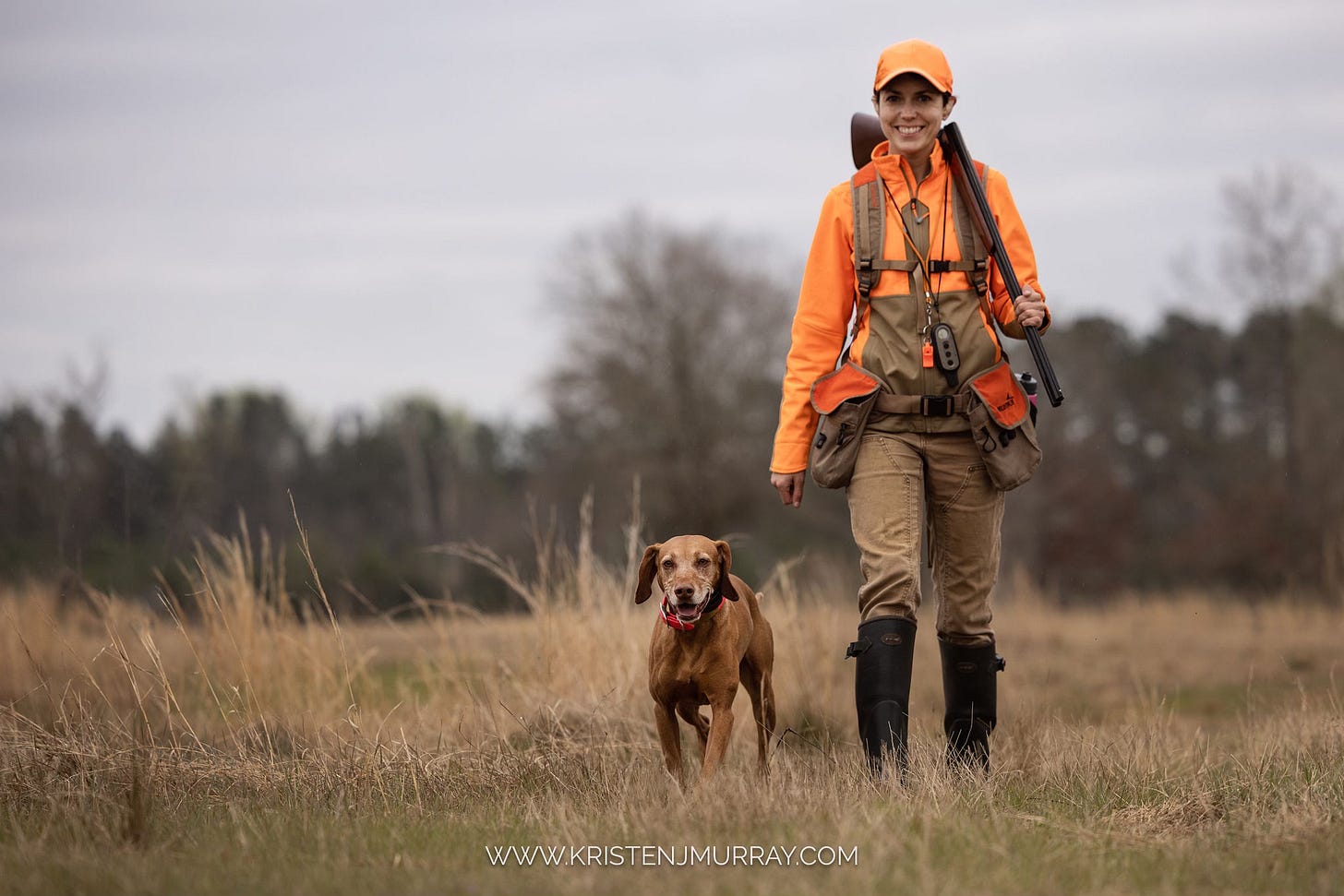“I think it can be unreasonable to expect that one day you'll just wake up super excited about something or know exactly what you want to do with your life.” — Terry Ann Fernando
“A dog? Why on earth would you want to get a dog?”
When Terry Ann Fernando’s husband first suggested they get a dog, her answer was a hard no. “Why would you want one?” she asked, genuinely baffled. “They’re so much work. They’re just constantly eating your shoes.”
Growing up, Fernando saw dogs as a lot of work with little reward, and as a graphic designer and competitive runner, she wasn’t interested in taking on more responsibility. But her husband wouldn’t take no for an answer, and eventually, she agreed. The Fernandos ended up not just with any dog, but a Vizsla — a hunting dog with instincts Fernando never anticipated.
Fast forward to today, and Fernando is deeply invested in bird dog sports, especially hunting dog events and competitions for pointing breeds — where dogs and handlers work in sync, testing their skills in pointing, tracking, and retrieving. She now happily devotes hours a day to training and exercising her dogs (she now has three) — Zara, Colombo, and Lanka. Weekends are spent on the road, often driving hours to set up camp and test her dogs’ skills against the highest standards in competitions. She’s even written a book, The Accidental Bird Dog: My Journey With an Extraordinary Vizsla, and now teaches others how to get started in the world of hunting dog events and competitions.
But Fernando’s love for working with her dogs didn’t start as a full-blown obsession. For the first year, Zara was just a pet: “I didn’t want to hunt,” Fernando recalls. “I had no interest in it.” Competitive dog training wasn’t even a blip on her radar; instead, she channeled her competitive drive into running races — a world far removed from dog sports.
Then, Zara’s breeder invited Fernando to try a junior hunting test with her. Though hesitant, Fernando agreed, having seen Zara’s natural hunting instincts in action while chasing squirrels in the backyard. After a short period of training, Zara passed with flying colors. The other participants were impressed — “Who is this dog?” they asked her. “And who are you?” This sparked something in Fernando. She liked the idea of helping Zara reach her full potential as a Vizsla, a breed renowned for its hunting abilities. More than that, she loved the sense of teamwork and accountability that bird dog sports offered — something she’d missed in her years as a solo runner.
Still, she approached the sport cautiously. Over the next few years, she researched training techniques, joined a hunting dog club, and connected with other enthusiasts. As her passion slowly grew, she entered Zara in more competitions, tried new events, and eventually added Colombo and Lanka to the mix. With each step, that initial spark grew bit by bit. Her passion didn’t ignite all at once; it developed gradually, fueled by her openness at each stage.
Psychologists often point to “openness to experience” as a key trait when it comes to developing and sustaining our passions. This openness goes beyond simple curiosity; it’s about giving ourselves permission to explore unfamiliar things, even if they’re outside our comfort zone. It means resisting the urge to shut down prematurely and instead giving ourselves the opportunity to test the waters, step by step.
If Fernando had dismissed her husband’s idea of getting a dog at the start, or if she hadn’t been open to the many opportunities along the way, she never would have discovered her passion. Her openness made all the difference — as did her slow approach.
“I know there are people out there who, when an opportunity is presented, say ‘Let's go!’” she explains. “I'm not like that. I'm pretty risk averse. I'm more like, ‘hmm, let me think about it. Let me weigh my options.’”
There isn’t a single “right” way to pursue a passion, but Fernando’s method resonates with my own experience. I like to test the waters before diving in. Even with jiu-jitsu — a sport I now love to the point of spending hours a day training and planning my travels around competitions — I started slowly. I took it step by step, gathering information and building confidence before fully committing.
People who start too brightly often burn out just as fast, jumping in with intense enthusiasm but giving up as soon as obstacles arise. By contrast, Fernando’s slow, steady approach gave her passion a solid foundation — one that’s unlikely to crumble.
“I think it can be unreasonable to expect that one day you'll just wake up super excited about something or know exactly what you want to do with your life,” she writes in Accidental Bird Dog. “You may not start out being enthusiastic about a particular thing or have any idea where it may lead. Instead, find something that sparks just a bit of interest in you and see where it goes.”
Ironically, the person who got her into this life, her husband, is now less involved. “It’s funny because he’s the one who originally wanted the dogs and the Vizsla,” she says with a laugh. “He loves them, he spends time with them… but I’m all in, and he’s not quite as in.”
Now, she can’t imagine not spending her days clad in knee high rain boots and a blaze orange jacket, her dogs by her side. Reflecting on her journey, Fernando writes: “It's hard to describe how completely my life and sense of identity has changed in the past 10 years. Before, I had zero interest in hunting… Now, there is literally no place I'd rather be than running in a field trial or walking through the woods with Zara hunting wild birds. My excitement over a weekend away for one of these excursions, let alone a bigger event, is unmatched. I am like a kid waiting for Christmas in anticipation.”
Maybe all it takes to feel like kids waiting for Christmas is a small spark — and the openness to see where it leads.
Takeaways
Here is one big thing I learned this week about passion, one exercise you can do to stoke your own inner fire, and one aspect of Fernando’s intense enthusiasm that rubbed off on me — and that I now want to learn more about, too!
One Lesson: Embracing a Slow-Build Approach to Passion
Fernando’s journey shows that sometimes the most lasting passions are those that start small and grow gradually. By moving forward step by step — learning, testing, and adapting at her own pace — she built a foundation that feels deeply rooted and authentic. The takeaway? There’s value in letting passion develop over time instead of diving in headfirst. Ask yourself: Where in your life could a more gradual approach help you build a stronger, more sustainable interest?
One Exercise: Identifying New Sparks
Make a list of areas in your life where you could be more open to new interests or challenges. Think about hobbies, activities, or even career paths you’ve been curious about but haven’t pursued. Next to each item, jot down one small step you could take to test the waters. Maybe it’s a new fitness class, a beginner’s course, or spending a weekend researching a new skill. Remember, you don’t need to commit fully — just give it a try and see if a spark catches.
One Curiosity: Exploring Dog Sports with My Beagle, Rocket
After learning about Fernando’s journey, I’m curious to explore what dog sports my own beagle, Rocket might enjoy. Beagles have natural tracking instincts, which could make activities like scent work or tracking trials a good fit. She’s 15, but still full of energy — you never know!
Links
Full Interview Transcript
Become a paid subscriber to access the full transcript of my conversation with Terry Ann Fernando below!
Keep reading with a 7-day free trial
Subscribe to On Fire to keep reading this post and get 7 days of free access to the full post archives.






